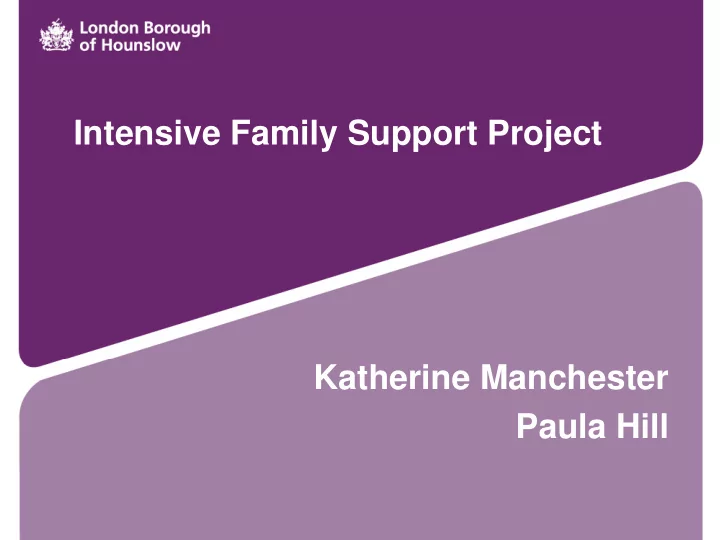

Intensive Family Support Project Katherine Manchester Paula Hill
What is the Intensive Family Support Project • The Intensive Family Support Project (IFSP) is part of Hounslow’s response to supporting families with multiple and complex difficulties which is now to be seen in the context of the Government's Troubled Families initiative.
Who are families with multiple difficulties? Poor parenting No parent in the family is working Family lives in poor-quality Truancy, exclusion or low or overcrowded housing educational attainment No parent has any qualifications Family in debt Drugs or alcohol misuse Mother has mental health problems Marriage, relationship At least one parent has a long-standing limiting illness, disability or infirmity or family breakdown Family has low income Domestic violence (below 60% of the median) Family cannot afford a number Offending and anti-social behaviour. of food and clothing items Risk factors attributed to families with 5 or more disadvantages (from) Families At Risk: Background on families with multiple disadvantages, Social Exclusion Taskforce Research Report, 2007 Additional risk factors from families supported through family intervention (NatCen, Mar 2010).
Who are the IFS families? Currently: 20 of Hounslow’s most challenging, high cost families over the next 1-2 years Target group of families: • Complex needs which are longstanding, entrenched, often over generations • Historically known to multiple services and have struggled to make and maintain positive improvements. • Experience a number of risk factors/disadvantages • High cost to the borough and often several agencies involved at the same time, with duplication of interventions through a lack of co-ordination.
Aims of IFSP • Resolve / contain the primary presenting problem e.g. offending, poor parenting, respite to the community • Move families to a point where they can cope effectively • Increase the resilience, strengthen independence and problem solving skills of individuals and the family as a whole • Reduce dependence on targeted and specialist services • Tackle the underlying factors keeping families stuck in the cycle of not coping and/or deprivation • Deliver substantial cost savings for all of us
Identification of families All partner agencies (within our information sharing protocol) were invited to share their 20 most challenging, high cost families. Police Community Safety Housing Schools Children’s Centres – including Sure Start Council
141 Families 40 shortlist 20 cohort Identifying families
Current Cohort 15 families are being worked with and 3 are currently being introduced to the service, this includes: 20 parents/ carers 53 children
IFS approach • Dedicated keyworker allocated to each family. • Persistent and tenacious engagement phase • Intensive interventions, which can include visiting the family daily • Small case loads, 5-6 families per keyworker • Whole family assessments and family support plans which are regularly reviewed
IFS approach • Strengths based approach with each family, whilst challenging behaviour as required. • Co-ordination of multi-agency, team around the family • Short, medium and long term goals agreed with the family, including an engagement phase, maintenance and exit strategy. • Keyworkers draw on a number of tools and strategies to support each family according to their needs. • Keyworkers work alongside families and model positive behaviours and actions
Successes so far – engagement with education Young person who has not engaged with education since late 2011 has been accepted onto the Fresh Start course. Keyworker has supported a young person whose education placements have recently broken down, and their parent to visit a proposed new school, this visit went well and both report liking the school. Placement is due to start in September 2012.
Successes so far – engagement with pre-school provisions 2 families have been supported to access funding for pre-school placements. Since these placements have started the keyworker has noticed improvements in their speech and language skills.
Successes so far – parental employment and skills development Parent long term out of work has expressed a desire to volunteer. The keyworker has accompanied them to a volunteer appointment and supported them to access information about volunteering opportunities. A keyworker has supported a young adult to attend a volunteering assessment.
Successes so far A keyworker has nominated a young person for a Personal Achievement Award in recognition of the significant improvement in their behaviour, including becoming more caring and concerned about the feelings of others, more positive family interactions and also their dedication to caring for their horse. This brilliant improvement has been noted by IFS and school.
Successes so far – practical issues Keyworkers have supported families to source new washing machines, cookers and furniture. Keyworkers have offered practical assistance with deep cleaning of the home and removal of rubbish from properties. Keyworkers have advocated for families in communication with housing departments around avoiding evictions, as well as repairs and maintenance.
Successes so far - housing • Progress towards eviction has been avoided in 3 cases. • Keyworker has accompanied adult child to a housing interview to explore and understand her housing options.
Feedback from parents I feel more confident since starting to work with IFS. Help with my child’s education placement has helped me to feel ‘less stressed’. My keyworker has given me the confidence to start to control my finances and to start to parent better. I am now able to trust professionals
Observations of positive impacts • These are the improvements that we have noticed for the children and young people: • Consistent daily routine • Being clean and presentable • Improved living conditions • Getting to school on time • Improved school attendance • Access to extra curricular activities • Improved relationships with parents and siblings • Improved personal safety • Better management of health needs • Improved behaviour in the community
Recommend
More recommend